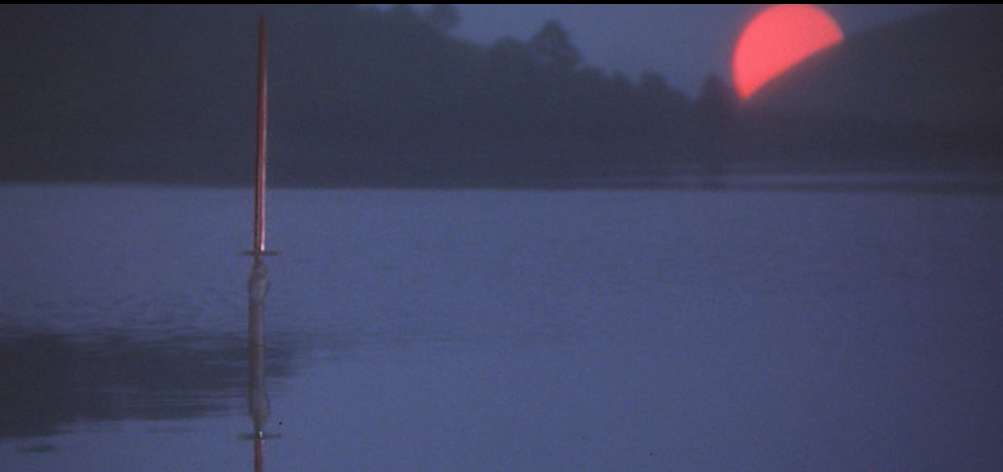Movie Review: Excalibur (1981) directed by John Boorman
It is the Dimly-Lit Ages, and nearly indistinguishable armored warriors clash in the night. A man stands apart and calls quietly, yet is heard clearly. It is Merlin, and the warlord to whom he speaks is Uther Pendragon. Merlin is guiding Uther’s rise to power over the land, to unify it, and helps the king find the powerful sword Excalibur. With these aids, Uther is at last able to make peace with Cornwall, his strongest rival. But the peace falls apart when Uther decides he wants to have sex with Cornwall’s wife Igrayne.

Uther talks Merlin into helping him bed Igrayne, which is accomplished by an elaborate illusion making Uther look like Cornwall, allowing rape by deception. Igrayne’s daughter Morgana realizes the trick, but who listens to a four-year-old? Cornwall dies, allowing Uther to marry Igrayne openly, but Merlin takes custody of the resulting baby, Arthur. This time, Merlin is sure he has the true king to bring unity to the land.
This retelling of the Arthurian cycle is a delight for the eyes, rich in symbolism and detail. It leans heavily into the mythical elements of the tale, giving Merlin impressive magical power. (But not without cost–setting up Uther’s one night stand makes Merlin take a nine-month nap to recover.)
Much of the story will be familiar to experienced readers and watchers. Arthur is revealed as the rightful king by obtaining Excalibur, overcomes initial resistance, falls in love with and marries Guinevere. He finds the best knights, and forges them into the Fellowship of the Round Table. The greatest of his knights is Lancelot du Lac, who also falls in love with Guinevere, which ends in tragedy.
Arthur’s half-sister Morgana steals Merlin’s power and uses it to rape King Arthur in the seeming of Guinevere. This, combined with the betrayal of Guinevere and Lancelot, breaks the kingdom, and the knights set out on a quest for the Holy Grail, which alone can heal the wounds. By the time Arthur and the land are healed, Arthur and Morgana’s son Mordred has grown to manhood and seeks to usurp his father.
This movie was very influential in how other Arthurian projects approached the material, and did wonders for the careers of several of the actors. (Patrick Stewart! Helen Mirren! Liam Neeson!) The acting is excellent, if often loaded down with Shakespearean bombast, and Nicol Williamson as Merlin gets some top-notch lines, both portentous and sarcastic. Many of the individual scenes are iconic. I especially liked the short scene where it’s made clear that Camelot is not just a military stronghold, but a center for science and the arts.
However, the film is covering about sixty years of story, which requires skipping ahead quite a bit, so those not familiar with the Arthurian lore may be confused. (About forty minutes were cut from the three hour version, but that wouldn’t have helped much.) Nigel Terry as Arthur is badly miscast for the scenes where he’s supposed to be about fourteen years old, but much better as the adult king.
There’s a fair bit of nudity (equal opportunity!), some onscreen sex, and considerable gore in places.
Recommended for Arthur fans who prefer less realism and more symbolism and magic.
